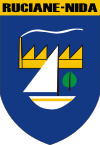Popielno (Ruciane-Nida)
| Popielno | ||
|---|---|---|

|
|
|
| Basic data | ||
| State : | Poland | |
| Voivodeship : | Warmia-Masuria | |
| Powiat : | Pisz | |
| Gmina : | Ruciane-Nida | |
| Geographic location : | 53 ° 45 ' N , 21 ° 38' E | |
| Residents : | 180 (2006) | |
| Postal code : | 12-220 | |
| Telephone code : | (+48) 87 | |
| License plate : | NPI | |
| Economy and Transport | ||
| Street : | Wierzba → Popielno | |
| Rail route : |
Olsztyn – Ełk train station: Ruciane-Nida |
|
| Next international airport : | Warsaw | |
| Danzig | ||
Popielno [ pɔˈpjɛlnɔ ] ( German Popiellnen , 1928–1945 Spirding ) is a village belonging to the municipality Ruciane-Nida in southeastern Masuria in the Polish Warmian-Masurian Voivodeship , Powiat Piski .
The village is located 22 kilometers northwest of the small town of Pisz (German Johannisburg ) on a peninsula on the west bank of the Jezioro Sniardwy (German Spirdingsee ).
history
The village Popielno or Popiellnen was founded in 1694 as a domain . The name of the place is derived from the Polish popiół for ashes .
On April 8, 1874, an administrative district of Guszianka was formed from the rural community of Wigrinnen and the estate districts of Diebowko, Guszianka - Forst, Popiellnen and Warnold , which was initially administered by the head of the district in Guszianka.
On March 30, 1875, large parts of the Guszianka manor forest were incorporated into the Popiellnen manor.
From 1898 to 1945, Popiellnen, with its predominantly Protestant population at that time, was incorporated into the parish of the Weissuhnen Church (now in Polish: Wejsuny). It was in the church district of Johannisburg (Pisz) in the church province of East Prussia of the Church of the Old Prussian Union . Even today this church is the house of worship for the now numerically small population of Wejsuny. It is looked after from Pisz and belongs to the Masuria diocese of the Evangelical-Augsburg Church in Poland . A smaller chapel serves as a place of worship for the Catholic Church in Poland .
Until 1905 Popiellnen belonged to the administrative district of Gumbinnen , then to the administrative district of Allenstein .
With a restructuring of the administrative areas on January 1, 1908, the Guszianka district now comprised the rural communities of Piasken-Onufrigowen, Rudczanny and Wigrinnen and the manor districts of Guszianka - Oberförsterei, Popiellnen and Warnold.
On December 1, 1910, 97 inhabitants were registered in Popiellnen.
On September 30, 1928 the manor district Popiellnen was converted into the new rural community Spirding. Thus, in the course of the increasing Germanization of Masurian place names, the place got its new name Spirding, which goes back to the adjacent Spirdingsee. Occasionally the unofficial place name Spirdingsblick was also found. The exact origin of the name Spirding for lake and place has not been conclusively clarified. Presumably, the old Prussian word spirt for German resist , so a rebellious waters based on the the then settled here Sudovians earned.
In 1933, according to an official census, there were 117 inhabitants in Spirding.
On February 12, 1936, the Guszianka district was renamed Guschianka. Two and a half years later, the adjoining district was renamed Guschienen again.
In 1939 there were 121 inhabitants in Spirding.
Until 1945 there was a research station of the University of Königsberg in the village .
On January 27, 1945 the Red Army reached Spirding, whose civilian population had been almost completely evacuated shortly before. After the end of the Second World War in 1945, Spirding , which belonged to the German Empire ( East Prussia ) , fell to Poland. The resident German population, unless they had fled, was largely expelled after 1945 and replaced by new settlers from other parts of Poland. The place was renamed or renamed Popielno.
From 1975 to 1998 Popielno belonged to what was then the Suwałki Voivodeship , then joined the newly formed Warmian-Masurian Voivodeship in 1999 .
The small village Popielno, which emerged from the former research station of the University of Königsberg, has had a zoological research center of the Polish Academy of Science in Warsaw since 1955 , where beavers , bison and tarpans (wild horses) are bred, among other things . In particular, research is carried out here at the Institute for Genetics and Animal Breeding into extinct and endangered animal species, such as the re-breeding of the aurochs , which died out between 1400 and 1500 in what was then East Prussia.
The academy includes a 1,477 hectare nature reserve covering almost the entire peninsula , where the rare animal species have their shelter and through which the only road leading to Popielno leads.
In 1987 the number of inhabitants in Popielno, which is also closely related to the institute located there, peaked at 203. After that, it declined slightly with the political upheavals in Poland.
Attractions
- German cemetery with graves from the 18th and 19th centuries
- Barn from the middle of the 18th century
- Masurian wooden houses
- Forge from the early 20th century

